On the 30th anniversary of the Oslo Accords, the IDSF HaBithonistim movement set out to explore the manner in which the Israeli public perceives these agreements. The first part of the survey examined the agreements in hindsight and the conclusions were undisputable: the majority of the Israeli public believes that the Accords harmed Israeli’s security, that they had no contribution to the stability of diplomatic relations and economic growth, and that at the end of the day – did not tighten the relations between the Israelis and Palestinians.
As an organization that deals in applied research, we do not only reflect the analysis of past data, bit also derive the conclusions, the significance thereof and their likely implications for the future. In this case, we wanted to discern what the Israeli public views as plausible foundations and terms for any future negotiations for peace between Israel and the Palestinians.
The survey was conducted by the IDSF HaBithonistim research department and with the statistical guidance of Dr. Hagai Elkayam. The sample was conducted among 1,057 respondents from internet-using adult population (18+) in Israel monitored to ensure a proper distribution in terms of age, gender, nationality, religious affinity and political affiliation. For the combined sample (1,057 respondents), the maximum margin of error is ±3.01% with a 95% probability. For the Jewish sample (858 respondents), the maximum margin of error is ±3.35% with a 95% probability; For the Arab sample (199 respondents), the maximum margin of error is ±6.95% with a probability of 95%.
It should be noted that both parts of the survey were conducted before the October 7 terrorist attack against Israel, wherein 3000 Hamas terrorists breached the Gaza border and swept the Gaza environ community in a bloody rampage of massacre, slaughtering over 1,400 Israelis, Arabs and Bedouins and taking over 200 hostages. It is highly likely that in the wake of this attack, opinions have shifted in Israeli society and corroborate even more emphatically the sentiments reflected herein.
A Peace Agreement with the Palestinians and Its Correlation with Israel’s Security
A fundamental question which begs discussion when formulating the terms for negotiations for future peace, is an issue nearly never addressed: Why?
We posed the “why” question to the Israeli public asking whether it thinks that Israel should strive at any cost to achieve a peace agreement with the Palestinians, or do so only if signing such an agreement would be material to Israel’s security. In other words, is such a peace agreement a means with which to ensure Israel’s security or an end in itself. The results are unequivocal: 80% of the Israeli public believe that Israel should sing a peace agreement with the Palestinians only on the condition that it contributes to the country’s security.
A distribution according to nationality reflects significant differences between Jews and Arabs, with 92% of the Jewish respondents believing that a peace agreement should be obtained as a means of attaining peace and not as an end in itself. Only 33% of the Arab respondents thought so.
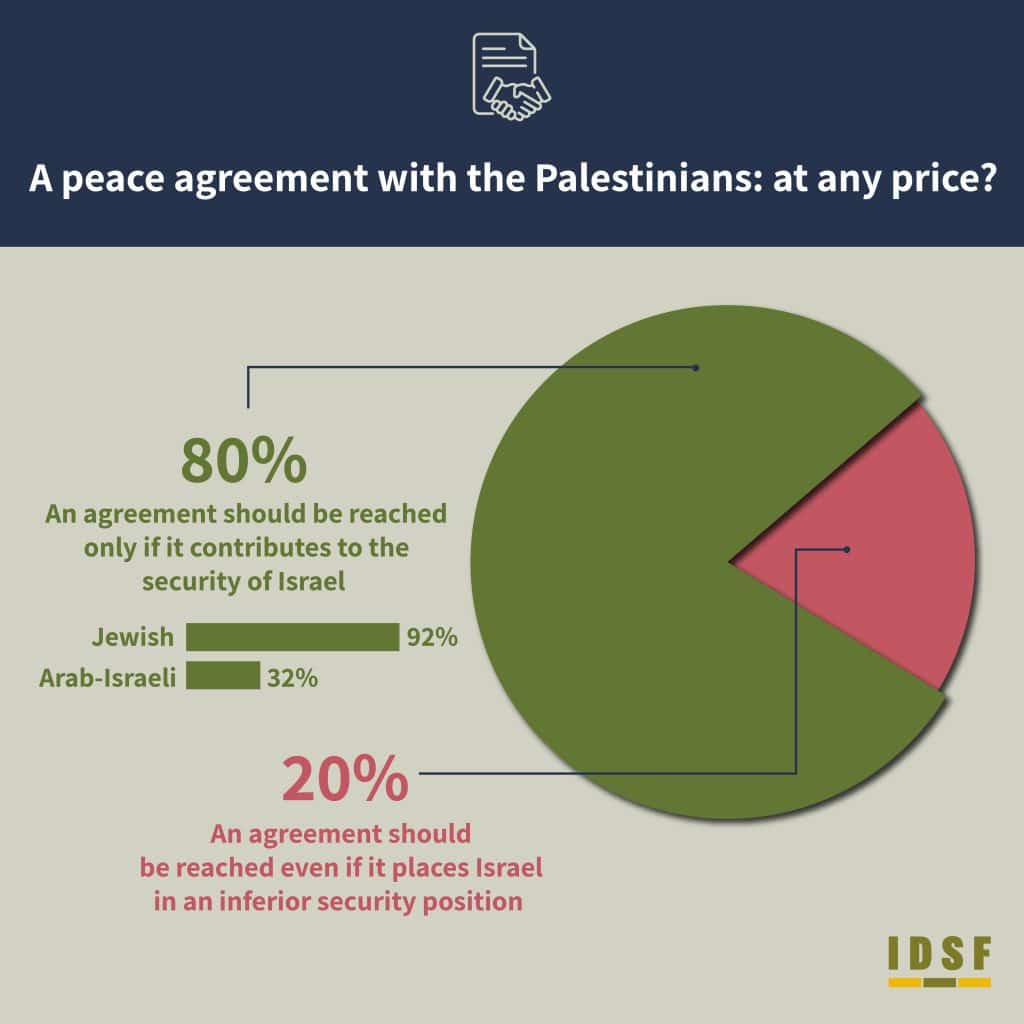
A Peace Accord with The Palestinians: At Any Cost?
A peace agreement should be obtained only if it contributes to Israel’s security 80%
A peace agreement should be obtained even if it puts Israel at a security disadvantage 20%
This means that most of Israel’s public is united in the opinion that a peace agreement with the Palestinian is not an end in itself, but a means with which to bolster Israel’s security. Strategically, the significance of these findings is that the securing of defensible borders is sin qua non to any future peace accord.
Core Issues Should not be Left for Last
The Oslo Accords was meant as an interim agreement on the way to a permanent arrangement. The thought process at the base of this interim agreement was that a peace process should be put in motion, and leave the more volatile issues for a later point, otherwise no progress could be made at all. Reality shows that this tactic does not hold true.
Indeed, when we asked the Israeli public how the core issues should be solved, we got a conclusive answer: 75% of the Israelis agree that a future peace agreement with the Palestinian must provide solutions to core issues such as the status of Jerusalem and the Palestinian refugee, and not leave them to a later resolution.
A distribution by national and political ideology shows no marked discrepancies between the Arab and right-wing, left-wing and political center respondents in regard to this statement.
The Day After Mahmud Abbass and Impact on the Peace Negotiations
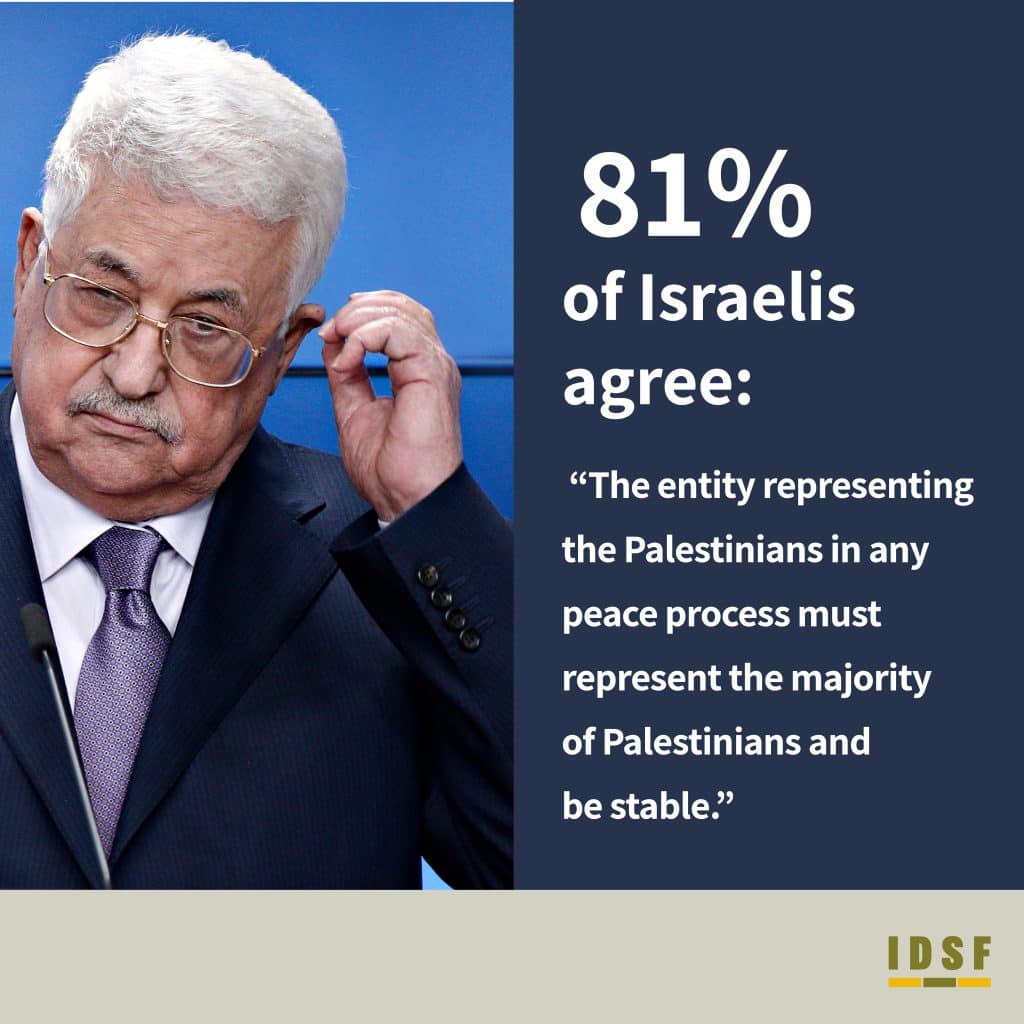
81% of the Israelis Agree: “the body representing the Palestinians in the peace process must represent the Palestinian majority and be a stable governing body”
Who represents the Judea and Samaria Palestinians? This is a rather complex issue, particularly in light of the fact that the days of Mahmud Abbas as head of the Palestinian Authority are numbered. The uncertainty around this bears upon the prospects of future peace negotiations. We asked the Israeli public if a prerequisite for future peace negotiations would be a stable governing body to represent the Palestinians. Here too, the response was straightforward: 81% of the Israelis agree with the statement that says that any party with which Israel will negotiate a future peace agreement must be a bona fide representative of the Palestinian majority and be a stable governing body.
Then we presented the respondents with an additional fact: at this point in time, no stable governing body representing the Palestinian majority exists. When presented with a list of potential replacement for PA chairman Mahmud Abbas, and asked the respondents whether they thought any one of this is a suitable representative of the Palestinian public, we found a wide distribution of responses. The Palestinian Authority – in effect the formal representative of the Palestinians – ranked last with the support of only 30% of the respondents. The Hamas ranked first with 58%.
It is no wonder, then , that the question regarding the Palestinian partner to a peace process, found that only 13% of the respondents – Jewish and Arab together – feel that there is a viable partner on part of the Palestinians for a peace process.
Negotiations Under Fire: The Israeli Public Says No
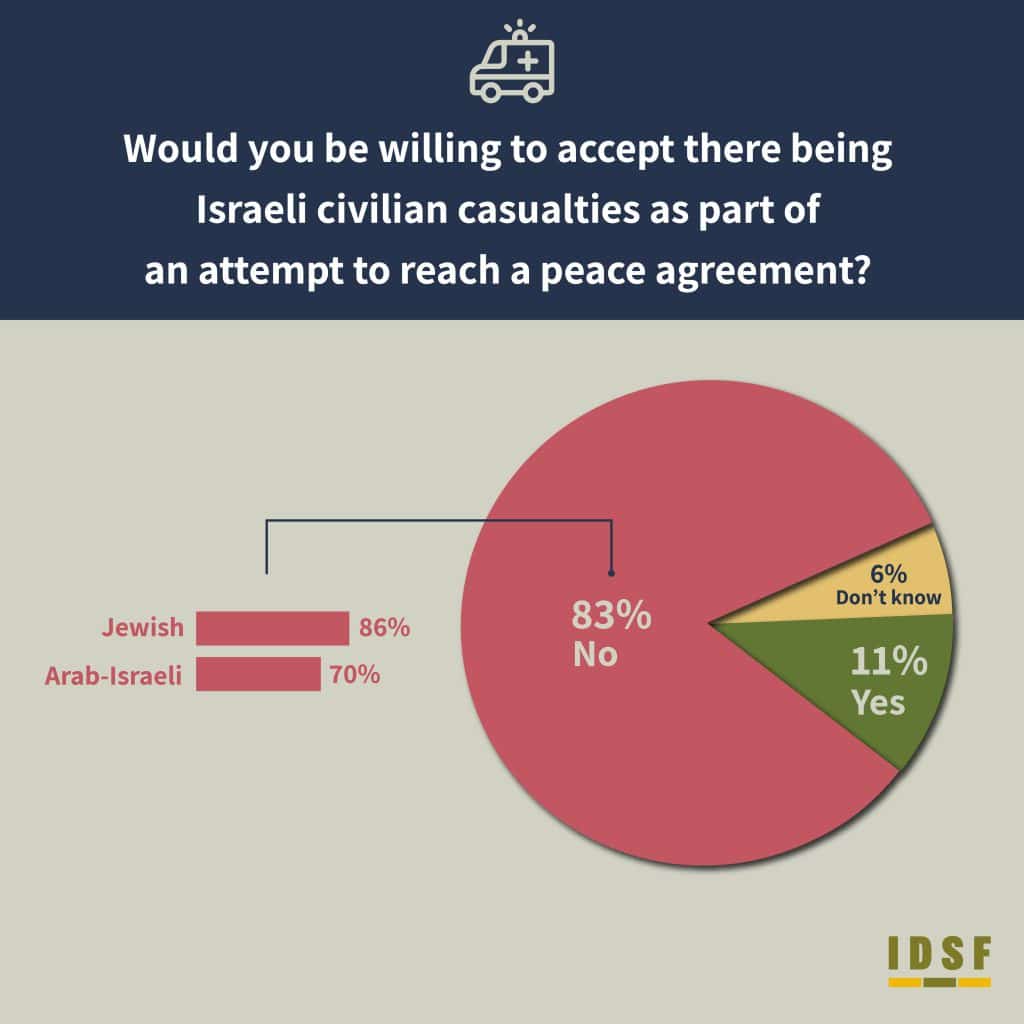
Would You Accept a Situation Wherein Israelis are Hurt by Terrorist Attacks During Peace Negotiations?
No 83%
Jews 86%
Israeli Arabs 70%
Yes 11%
Undecided 6%
The expressions “victims of peace”, describing the casualties of Palestinian terror attacks during/after the signing of the Accords was coined during the signing of the Oslo Accords. We now examined whether the Israeli public would be willing accept this state of affairs wherein Palestinian terror attacks persist even during a peace process. Results show that a large majority of 83% of the Israeli public will not accept this state of affair. This majority held true for the left-wing as well as the Israeli Arab respondents.
This data shows that the Israeli public had come to understand a simple truth: a situation in which innocent civilians are hurt due to terror attacks, while a process is underway to bring peace to the area is unacceptable. In this respect, the lessons of the Oslo Accords seem to have been well internalized by the public in Israel.
Another precondition for conducting peace negotiations set by the Israeli public is the silencing of the incitement against Israel. 77% of the respondents pose the silencing of the incitement as a stipulation for peace negotiations . A distribution of the responses by nationality, shows that among the Jewish respondents the figure is even more significant (85%), but among Israeli Arabs only 43% agreed that stopping the incitement would be a precondition for holding peace talks. Even when distributed by political distribution, differences are evident regarding the end of the incitement as a precondition: 96% of those identified with the political right support this as compared to 75% of the center and 52% of the left.
The data indicate that in the eyes of most of the public, even before any peace talks address the content of the agreements – which include various compromises, conditions and commitments – we must agree to change the sentiment against the State of Israel currently prevalent in Palestinian society.
Referendum: A Precondition for a Peace Agreement
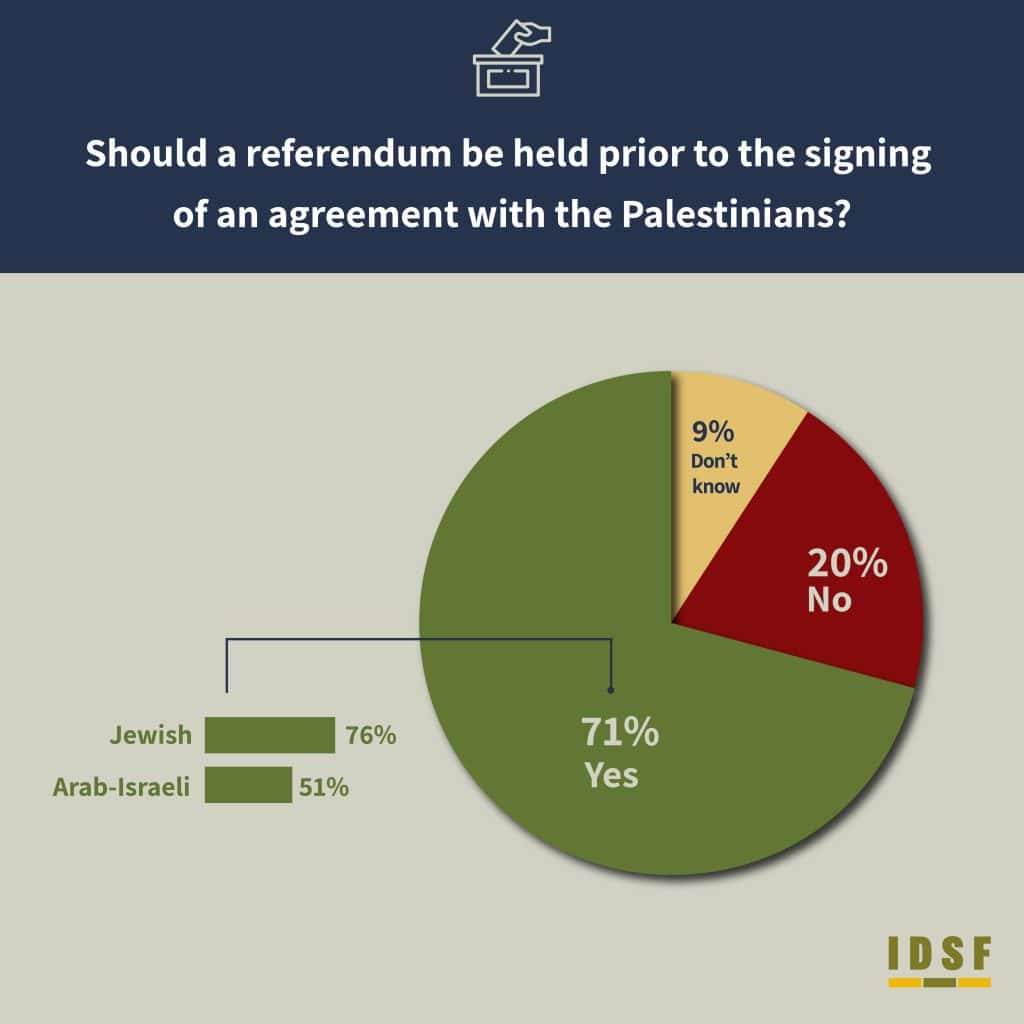
Should Israel Hold a Referendum Prior To Signing A Peace Agreement with The Palestinians?
Yes 71%
Jews 76%
Israeli Arabs 51%
No 20%
Undecided 9%
The transfer of land to another side of an agreement is a momentous and nearly irreversible matter, that demands an overwhelming majority. However, as is known, the Oslo Accords were voted in by a small and questionable majority in the Knesset.
When we asked the Israeli public whether a referendum should be held before a move that would entail handing over territories, 71% answered yes. In the distribution of Jewish respondents by political affiliation, it emerged that the right (88%) advocates this significantly more than the center (63%) and the left (41%). In fact, the Jewish left in Israel believes in the necessity of a referendum in such a case less than Israeli Arabs (51%).
One way or another, it seems that most of the Israeli public understands that the decision on a peace agreement exceeds the scope of routine decisions of its representative in the Knesset, and must be presented for direct decision by the people, albeit with varying degrees of agreement according to different segmentation of the respondants.
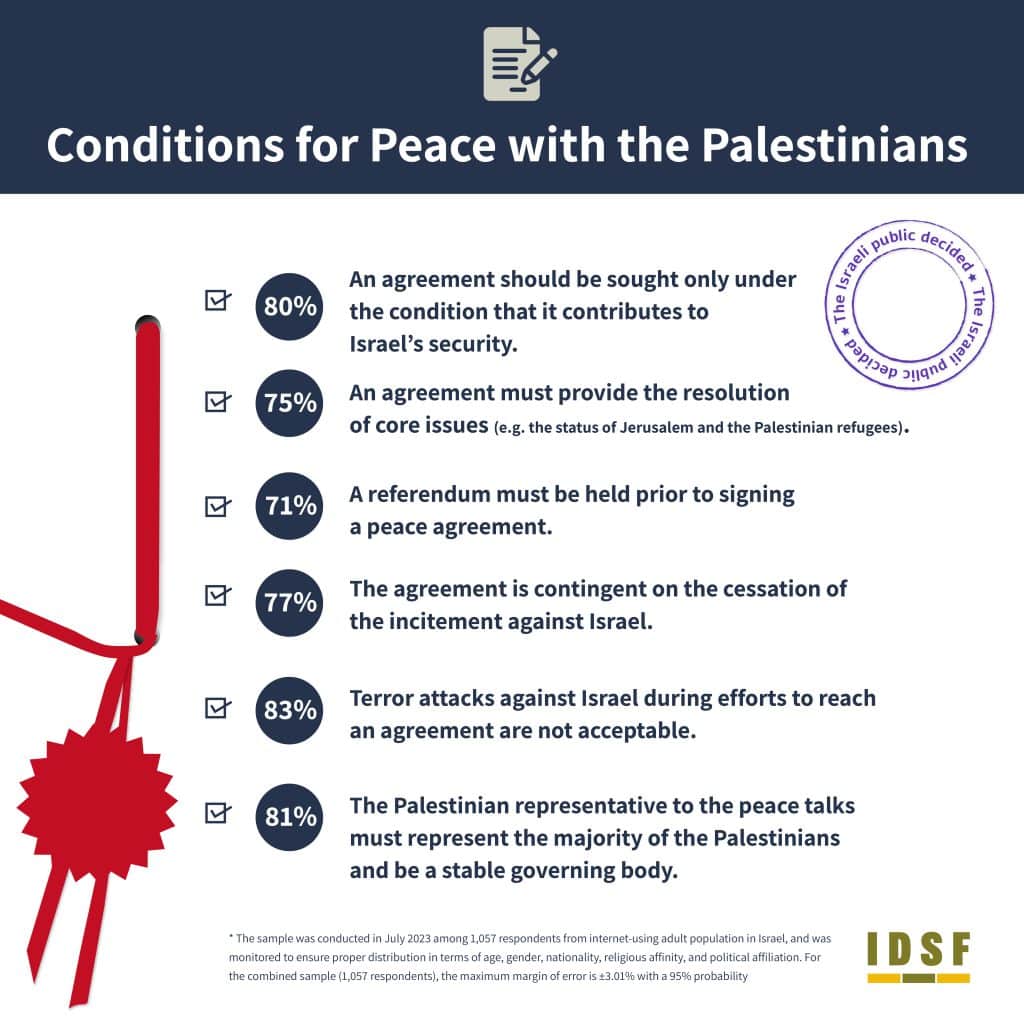
Conditions for Peace with the Palestinians
80% An agreement should be sought only under the condition that it contributes to Israel’s security.
75% An agreement must provide the resolution of core issues (e.g. the status of Jerusalem and the Palestinian refugees).
71% A referendum must be held prior to signing a peace agreement.
77% The agreement is contingent on the cessation of the incitement against Israel.
83% Terror attacks against Israel during efforts to reach an agreement are not acceptable.
81% The Palestinian representative to the peace talks must represent the majority of the Palestinians and be a stable governing body.
* The sample was conducted in July 2023 among 1,057 respondents from internet-using adult population in Israel, and was monitored to ensure proper distribution in terms of age, gender, nationality, religious affinity, and political affiliation. For the combined sample (1,057 respondents), the maximum margin of error is ±3.01% with a 95% probability
In conclusion, the Israeli public sets unconditional terms for continuing any peace process with the Palestinians: any future agreement is acceptable only on the condition that it contributes to Israel’s security, it is signed with a stable Palestinian governing body, it must include the resolution of core issues, and it must receive a “stamp of approval” by the Israeli public. Lastly, the survey shows beyond doubt that the public in Israel is not willing to accept the continuation of terror attacks against, or “peace victims”, and incitement against Israel on part of the Palestinians.
At the bottom line: any future agreement cannot recreate the mistakes of Oslo: Israelis want a peace agreement – but not at all costs wherein the end justifies the means.
